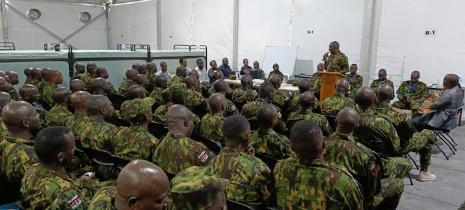Kenyan police officers in Haiti are participating in linguistic and intercultural training to enhance their operations in the Caribbean nation. The team will receive instruction in French and Haitian Creole, the primary languages of Haitian institutions and its population.
The Multinational Security Support (MSS) mission’s Force Commander, Godfrey Otunge, officially launched the month-long training program in Port-au-Prince on August 5. He emphasized that this initiative will assist personnel in fulfilling their mandate.
“Moving forward, language barriers will be eliminated as police officers gain the skills, knowledge, and competence needed to communicate and interact effectively with the local Haitian community that has welcomed them,” Otunge stated.
The Kenyan police are in Haiti to aid local officials in stabilizing gangs that have nearly overrun the capital. The training is sponsored and led by the French government through its Embassy in Haiti.
Officials noted that this training is essential for enabling personnel to work without obstacles. On October 2, 2023, the UN Security Council adopted resolution UNSCR 2699, authorizing the deployment of a non-UN Multinational Security Support (MSS) mission in Haiti under Chapter VII of the UN Charter for an initial period of 12 months.
The mission’s mandate is to support the efforts of the Haitian National Police (PNH) in re-establishing security in Haiti and creating conditions conducive to free and fair elections.
While French and Haitian Creole are the languages used by the institutions and population the MSS will engage with, several contributing states do not speak French or Creole.
To address this, the International Organization of La Francophonie (IOF), leveraging its experience in teaching the French language to uniformed personnel and a specialized learning method developed with France, has created a fully funded training package aimed at enhancing the linguistic (French and Haitian Creole) and intercultural skills of MSS personnel.
The goal is to improve the performance of all mission members and foster positive interactions with the host country to build a relationship of trust.
With support from France and other nations, various initiatives have been implemented in coordination with the UN to address language needs, according to Otunge. The instruction in Creole and French is being conducted in partnership with the Institutes Français, Alliances Françaises, and the United Nations Institute for Training and Research (UNITAR).
Additionally, the UN Human Rights Office provided the team with training on the compliance framework designed to integrate human rights and international humanitarian law principles into the planning, execution, and evaluation of security operations. Officers also received guidance on international standards and best practices concerning the use of force, particularly in relation to the MSS mission in Haiti.
In addition to Kenya, other countries that have committed to sending officers to Haiti include Benin, Jamaica, the Bahamas, Belize, Barbados, Antigua and Barbuda, Bangladesh, Algeria, Canada, and France.



